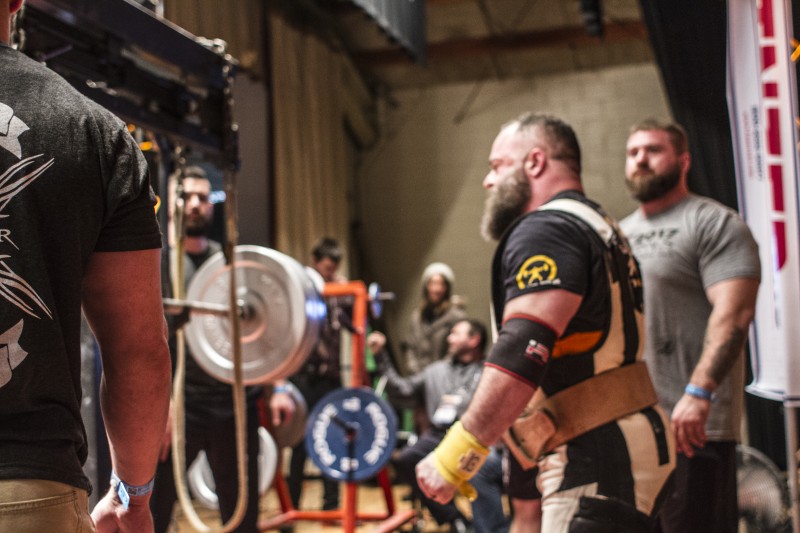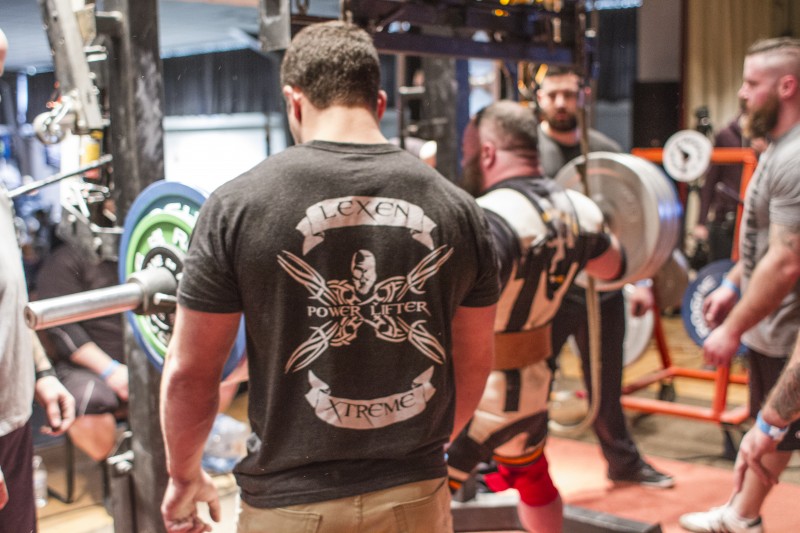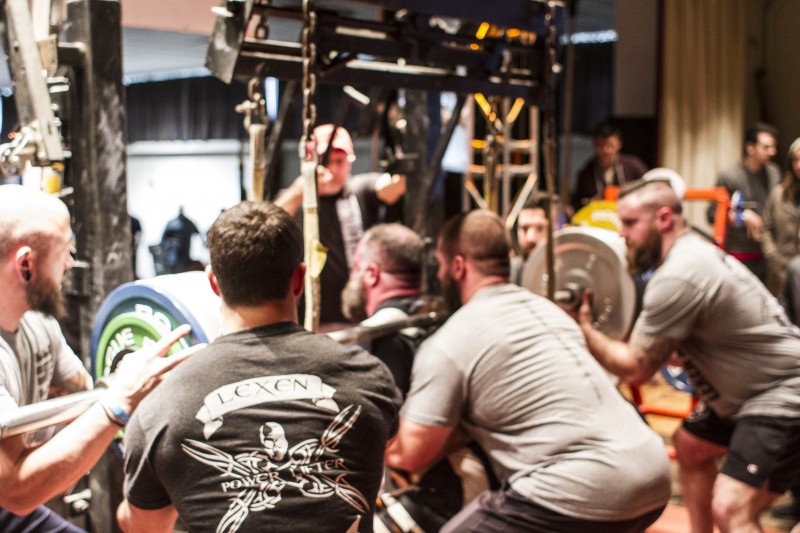
A question. What have you heard about me? Apart from the muttering, under breath, that surrounds my skill as a powerlifting coach — dear reader, what have you heard?
You might have heard it whispered that I am a tireless debauchee. And that's good, I like that. Because as history repeats itself, whispers are exchanged for sighs, and whatever face accompanies my own seems to soon disappear, anyway, which lends breath to a new round of whispers. And well, before long, a self-sustaining economy of self-fulfilling prophecy is established. Or so it would seem. But maybe I'm chaste as a fucking monk. (There is only one way to know for sure, and I would not recommend that.)
Nevertheless, this all likely held some sway over the fact that when I posted on Facebook last week asking for input on what topics I should write about for my column, the clear champion was the issue of sex within close proximity to competition and how it should be handled. I agree this is a topic which needs to be explored objectively, and I believe I am truly the man for the job. So here we are.
RECENT: Hunger Is Not Enough: Attempt Selection
As is usually the case, it's best we start at the beginning.
Athletic competition is nothing new. The ancient Olympic Games are traditionally dated to have begun around 775 BC, which has us creeping up on 3000 years of engagement in recorded history. The controversial concept that pre-game visits to Poundtown might hinder sports performance dates back just as far.
Experts in those days are said to have suggested athletes not engage in sex prior to the games, yet it seems almost no one got the memo. In fact, it's highly unlikely anyone got much sleep in the Olympic village. It was a giant, tented encampment, where parties continued into the small hours, every night, including hundreds of prostitutes (all male), who worked their asses off until the sun came up. So, while there is some conflict there, we can use our historical imaginations to put together what actually happened.

Married women were forbidden to attend the ancient Olympic Games (conveniently) and if they managed to make their way somehow to any part of the event grounds, they were rewarded with an all expenses paid, one way trip off a cliff, directly down to their own dramatic conclusions. And we know how women love to jump to conclusions, so one can assume this happened rather frequently.
Females were not excluded entirely from the games, though. In fact, all the single ladies were welcomed with open arms; more than likely as fodder for the orgies, but at least ostensibly to find husbands. This is all in spite of athletic recommendations to abstain from sex around the competition.
It is worth mentioning that women were allowed to compete in games of their own, which were an entirely separate, though well organized affair. A festival called Heraea: to worship Hera, the goddess of women and marriage (also married to her own brother, incidentally), consisted of entirely female competition. The "Women's Games," if you will.
Mostly young spartan girls competed in these games, which were really just foot races on a track not quite the length of the men's. Spartan women were encouraged to compete and train alongside the men (which they did naked), because increased athleticism was thought to breed better soldiers. And there is reason to believe these female athletes were just as sexually active before and even during their games as their male counterparts. Again, in contrast to what was suggested at the time.
Fast forward 2700 or so years to the 2016 summer Olympic Games in Rio. Organizers distributed just shy of a half million condoms during the games or over 40 condoms per person. The conventional wisdom among coaches remains that abstaining from sex is the best bet for performance, but so does an apparent stark contrast between recommendation and practice.
If we look to the scientific community for help on this matter we are decidedly underwhelmed by what is available. The only systematic review of studies conducted on the topic of sexual activity and athleticism I'm aware of looked at a total of just nine studies. Yes nine. Out of 512 references, only nine studies met the inclusion criteria (that the studies were regarding athletes having sex prior to competition, and if comparison was made it was to athletes abstaining from sex, and that an outcome on performance was included). Even the nine studies that made the cut had some serious issues. For example, none considered the role of confounding factors, none observed acute exercise or measured hormonal modification caused by sex in this context, a few of them were so poorly designed they did not use appropriate scientific method or reflect real life situations well, meaning they had little or no external validity and the list goes on. So, the conclusion of this review should be obvious without even reading it, but I will share with you my synopsis, since I did:
As of now the topic has only been poorly investigated, scientifically, but even the garbage quality literature available does not support the concept of a negative impact on performance being caused by sex, up to as close as 10 hours from the athletic event. So while the same recommendations survived 2700+ years of competition, there doesn't appear to be very good reason for that. Good thing, because basically no one listened to it.

Getting to the bottom of this is a problem which is multifactorial on both ends. The frustration of going without sex for more than 24 hours is probably going to be more detrimental than any potential negative effect the sex would have on performance, due to the psychological and emotional implications of abstaining in people who are regularly sexually active (like most athletes). Psychological and emotional stresses aside, there are some awesome physiological benefits to banging which we may not want to miss out on.
Sex improves sleep, for example, in a number of ways- and these effects can be plenty valuable to your regular training, not to mention the night before competition. Orgasms reduce cortisol, which is a stress hormone, so that effect is welcome. Sex, itself, stimulates the release of oxytocin, a hormone which can help establish an emotional connection with your partner and mediates those orgasms. And we know what happens after orgasms. (Well, some of us do.)
We fall asleep more easily.
According to a 2003 study in the journal "Regulatory Peptides," oxytocin released in the brain under stress-free conditions naturally promotes sleep. I'm sure some of you females reading this article are echoing a sentiment to yourselves I've heard from many partners over the years: that you don't feel drained or sleepy after sex the way men are known to — what the French refer to as "le petit mort" or "little death."
WATCH: Table Talk with Swede Burns and JP Carroll — Keeping Good Form Through Every Rep
Well, it may surprise you to hear that women actually have a gender-specific leg up when it comes to sleep after sex. This arrives in the form of elevated estrogen levels, which, in women, can enhance REM sleep. That suggests sex has the potential to improve sleep quality, at least for the ladies.
So, while the scientific jury is still out on the issue of sex in near proximity to competition (and likely to remain so for some time), I've been happy to explain the few things we do know, and now I'll get into the more plentiful things we think we know. I will outline my current position and recommendations on the topic in just a bit.
Generally and hypothetically at this point, regular sex seems to have a net positive effect on performance right up to as close as 8-12 hours from competition. After that, things get a little nebulous, and anecdotal reports (which are really all we have) begin to conflict. If we separate by gender, there are some interesting things to note, however.
This week I conducted a survey of 48 strength sport competitors who have had sex within 12 hours of competition. The vast majority of respondents were male (38), but I think enough females participated (10) to get a useful picture from them, as well.

Keep in mind this is all self-reported and the main point of interest was whether or not the competitor "felt" like the sex had a positive impact, a negative impact or no impact on their athletic performance. This is problematic data for a bunch of reasons- namely that there is no way to accurately compare a control group to the people interviewed or accurately measure the result and so we are relying on the athlete to self-report their own outcome and there is probably a good amount of bias at play. Still, it's interesting anecdotal evidence at the very least.
Points of interest I took from the survey:
- Men seem much less likely than women to have sex on the actual day of the meet, prior to performance.
- ~90% of men and every woman interviewed felt that sex as soon as the night before competition did not have a negative impact on performance.
- Women seem about twice as likely as men to report a positive impact on performance from sex (80% of women interviewed compared to only 37% of men).
- The vast majority of men (~53% compared to only 20% of women) reported the sex had no impact whatsoever on performance.
- Strength athletes, on the whole, fucking suck at reading comprehension and following directions.
All of this jives with what I have seen and heard reported throughout my career as an athlete and coach. I was mildly surprised, however, to see that so many men were comfortable having sex the night before competition. I have always had sex the night before, myself, and not taken any issue with my lifters doing so, but I've heard from many others in the past who were afraid it would have a negative impact on performance. So it was reassuring to see that so many outside of my sphere of influence are actually on the same page.
In closing, my current position and recommendations on this topic are fairly simple:
- Men should have sex as often as they like throughout the course of normal training cycles up to as close as six hours prior to training, with no such limitation imposed on women.
- Men should probably abstain from sex any sooner than the night before competition with no such limitation imposed on women.
- Women might actually do well to have sex in close proximity to training or competition (2-4 hours), but that is by no means clear. Feel free to experiment.
That's it. Nothing too complicated. There is no reason to believe at this point that extended periods of abstinence will improve performance. Don't make yourself miserable for nothing. If I had to give up sex for powerlifting, I'd probably just collect stamps instead. Seriously.
If you found this helpful, please share it on your social media and feel free to reach out with topics you'd like to read me prosing-on about in the future.











3 Comments